Eight Hours of Terror Blu-ray Movie
HomeEight Hours of Terror Blu-ray Movie 
8時間の恐怖 / Hachijikan no kyôfu / Blu-ray + DVDArrow | 1957 | 78 min | Not rated | No Release Date
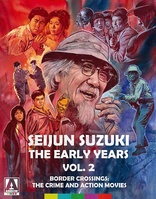
Price
Movie rating
6.7 | / 10 |
Blu-ray rating
| Users | 0.0 | |
| Reviewer | 3.5 | |
| Overall | 3.5 |
Overview
Eight Hours of Terror (1957)
A bus making its precarious way across a winding mountain road picks up some unwelcome passengers.
Starring: Nobuo Kaneko, Harue Tone, Sumiko Minami, Hisako Hara, Kenjiro UemuraDirector: Seijun Suzuki
| Foreign | 100% |
| Crime | 9% |
| Action | Insignificant |
Specifications
Video
Video codec: MPEG-4 AVC
Video resolution: 1080p
Aspect ratio: 1.34:1
Original aspect ratio: 1.37:1
Audio
Japanese: LPCM Mono
Subtitles
English SDH
Discs
Blu-ray Disc
Two-disc set (1 BD, 1 DVD)
DVD copy
Playback
Region A (B, C untested)
Review
Rating summary
| Movie | 3.5 | |
| Video | 3.5 | |
| Audio | 3.0 | |
| Extras | 4.0 | |
| Overall | 3.5 |
Eight Hours of Terror Blu-ray Movie Review
Reviewed by Jeffrey Kauffman April 30, 2018Note: This film is available as part of Seijun Suzuki: The Early Years, Vol. 2 - Border Crossings: The Crime and Action Movies
.
Arrow is continuing to give Japanese cinema fans a field day with new sets devoted to the genre offerings of Seijun Suzuki. Almost a year ago
now,
Arrow released Seijun Suzuki's The Taisho
Trilogy, a trio of frankly often near hallucinatory efforts that initially had their theatrical exhibitions in the 1980s and 1990s. Arrow has
now
reached further back into what might be thought of as the formative years of Suzuki, offering both Seijun Suzuki: The Early Years, Vol. 1 - Seijun Rising: The
Youth
Movies (which Arrow has unfortunately been unable to provide a screener for as of the writing of this review) and Seijun Suzuki: The
Early
Years, Vol. 2 - Border Crossings: The Crime and Action Movies. This second volume obviously includes the sobriquet “Crime and Action
Movies”, and as fans of Suzuki will know, at least some of his now considerable reputation was built upon yakuza outings, but as the rest
of
that subtitle announces, probably all five films in this set could be seen as crossing borders, i.e., incorporating the kind of crazy quilt combo platter
of
idioms and approaches that became a Nikkatsu hallmark, namely the so-called “borderless action” film.
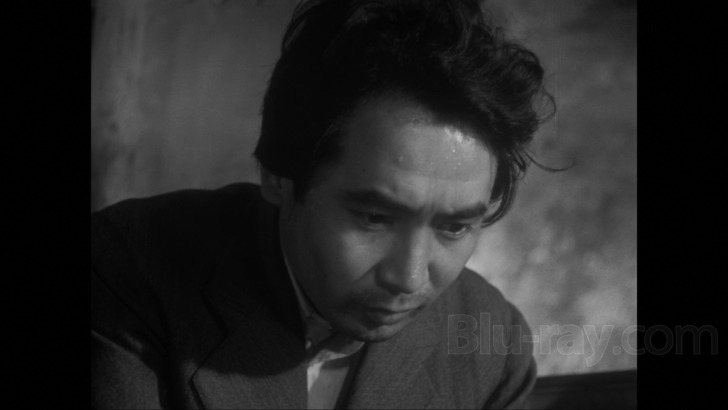
Could Seijun Suzuki (or perhaps screenwriters Gorô Tanada and Rokurô Tsukiji) have been a John Steinbeck fan? That question may occur to some cineastes as they watch Eight Hours of Terror, since it bears more than a few passing resemblances to another 1957 film, one which was based upon a Steinbeck novel, The Wayward Bus. The interesting thing about this cinematic doppelgänger situation is that, according to some online data I researched in preparation for this review, Eight Hours of Terror was actually released in Japan a few months before The Wayward Bus made it to screens in the United States, but that said, Steinbeck’s original source novel had been out since 1947. As with The Wayward Bus, Eight Hours of Terror posits a motley crew of bus passengers, some of whose stories are revealed during a treacherous journey through scenic if scary mountainous terrain that at least occasionally works in elements of what came to be known as the disaster film.
There are at least a couple of other correspondences, including some family dysfunctions among various travelers, as well as an aspiring actress and one woman who may be of ill repute (to use an old fashioned phrase). Where Eight Hours of Terror departs rather dramatically from The Wayward Bus is its introduction of some vicious criminals on the lam from a robbery, something that pushes some already fairly melodramatic plot elements involving some of the other characters (including another supposed convict) into full blown hyperbolic mode. Several sources, including the essays in the insert booklet that is part of this set, cite films like Lifeboat and Stagecoach as forerunners of and/or perhaps even inspiration points for Eight Hours of Terror.
While it probably makes more sense to cite those films rather than The Wayward Bus as true progenitors, in one way there's yet another undeniable tether between Eight Hours of Terror and the film based on the Steinbeck novel, and that's in terms of their general quality. It would be hard to match the general excellence of either the Alfred Hitchcock or the John Ford film in any case, but as even analyst Tony Rayns mentions in a supplement included in this set, it’s difficult to evaluate Eight Hours of Terror or really any of its other siblings included in this set as being anything other than a B-movie. That said, this is well constructed and often rather surprisingly suspenseful, with some good use of location photography at several key moments of high drama. Some of the subtext in the film dealing with class consciousness and the socioeconomic woes of Japan in the post World War II era are also rather sharply detailed, given the kind of histrionics that are at least occasionally on display.
Eight Hours of Terror Blu-ray Movie, Video Quality 
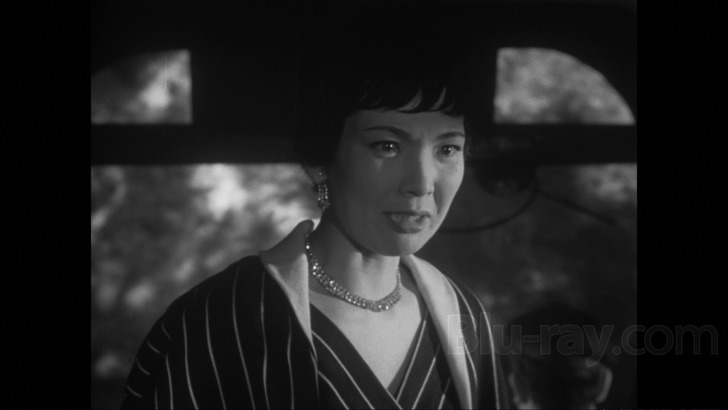
Eight Hours of Terror is presented on Blu-ray courtesy of Arrow Video with an AVC encoded 1080p transfer in 1.34:1. Arrow's insert booklet only contains the following pretty generic verbiage about all five films in this set:
The films in this collection were remastered in high definition by Nikkatsu and delivered to Arrow Films. Additional restoration and grading work was completed at R3store Studios in London. Each film is presented in its original aspect ratio with its original mono audio.This is the only (near) Academy Ratio outing in this set, and while it doesn't quite offer the same consistent qualities of Smashing the 0-Line (which is in 2.35:1), it's considerably better looking than the one other black and white film in this set, The Sleeping Beast Within. There are occasional evident signs of age related wear and tear in terms of things like small scratches and actually pretty large reel change markers, but the biggest issue facing this transfer is variable contrast. Some of the presentation looks spot on, with deep blacks and nicely modulated gray scale, but other moments have pretty milky looking blacks and a kind of hazy miasma overlaying the imagery. Grain resolves naturally throughout and helps to make this commendably organic looking.
Eight Hours of Terror Blu-ray Movie, Audio Quality 
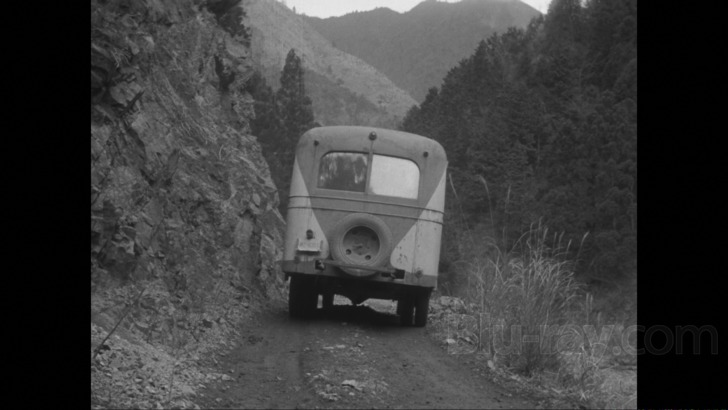
Eight Hours of Terror features an LPCM Mono track in the original Japanese. There are occasional slight age related issues that can be heard here, including very brief scuffs and the like, but there's a surprising homogeneity to the track considering the variety of studio and location work (it does look like some post looping must have been done). Everything sounds slightly boxy, and some of the more strident music cues have slight distortion, but there's nothing overly problematic.
Eight Hours of Terror Blu-ray Movie, Special Features and Extras 
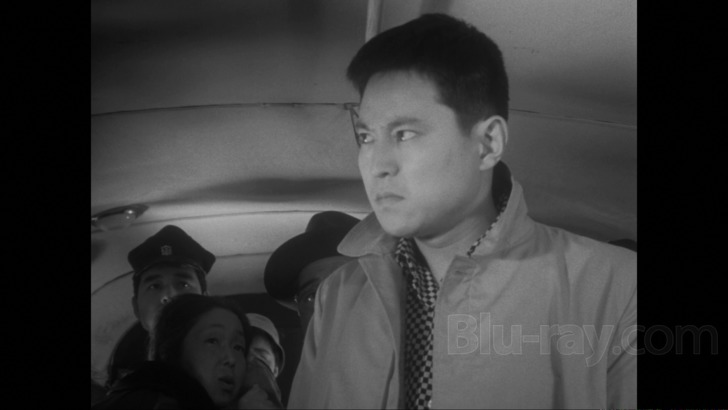
Disc Two of this set contains Eight Hours of Terror, Tokyo Knights and The Man With a Shotgun along with the following supplements:
- Trailers
- Man With a Shotgun (1961) Trailer (1080p; 4:16)
- Tokyo Knights (1961) Trailer (1080p; 3:51)
- Still Galleries
- Eight Hours of Terror (1957) Gallery (1080p; 00:24)
- Man With a Shotgun (1961) Gallery (1080p; 00:21)
- Tokyo Knights (1961) Gallery (1080p; 00:21)
Eight Hours of Terror Blu-ray Movie, Overall Score and Recommendation 
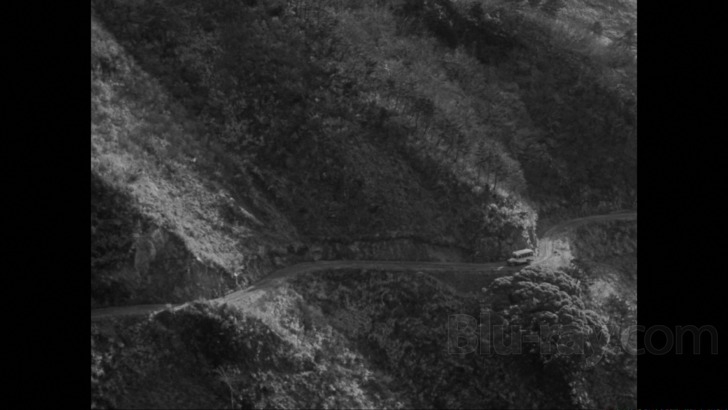
Perhaps just a little cheekily, Tony Rayns offers another cinematic comparison to 8 Hours of Terror, namely the relatively recent sensation Train to Busan. The enclosed, threatened space aspect is certainly comparable, as is the political subtext, but of course there are virtually no zombies in 8 Hours of Terror, an element I can imagine Suzuki actually probably would have considered somewhat later in his career. This is a solidly crafted and at times extremely suspenseful "programmer" that provides ample evidence of the talent Suzuki was already bringing to his job at Nikkatsu as early as 1957. Recommended.
Similar titles
Similar titles you might also like
(Still not reliable for this title)

The Man with a Shotgun
散弾銃の男 / Sandanju no otoko
1961

Detective Bureau 2-3: Go to Hell, Bastards!
探偵事務所23 くたばれ悪党ども / Kutabare akutô-domo - Tantei jimusho 23
1963

Smashing the 0-Line
密航0ライン / Mikkô zero rain
1960

Tokyo Knights
東京騎士隊 / Tokyo naito
1961

Youth of the Beast
野獣の青春 / Yajû no seishun
1963

First Love
初恋 / Hatsukoi
2019

A Touch of Sin
天注定 / Tian zhu ding
2013

The Gangster, the Cop, the Devil
악인전 / Akinjeon
2019

Furie
Hai Phuong
2019

Gangster VIP
1968

Massacre Gun
Minagoroshi no kenjû
1967

Dead or Alive
1999

Doberman Cop
ドーベルマン刑事 / Doberuman deka
1977

The Violent Professionals
Milano trema: la polizia vuole giustizia
1973

Ley Lines
1999

Black Tight Killers
Ore ni sawaru to abunaize
1966

The Tribe
Plemya
2014

The Connection
La French
2014

The Sleeping Beast Within
けものの眠り / Kemono no nemuri
1960

The Wind-of-Youth Group Crosses the Mountain Pass
峠を渡る若い風 / Tôge o wataru wakai kaze
1961